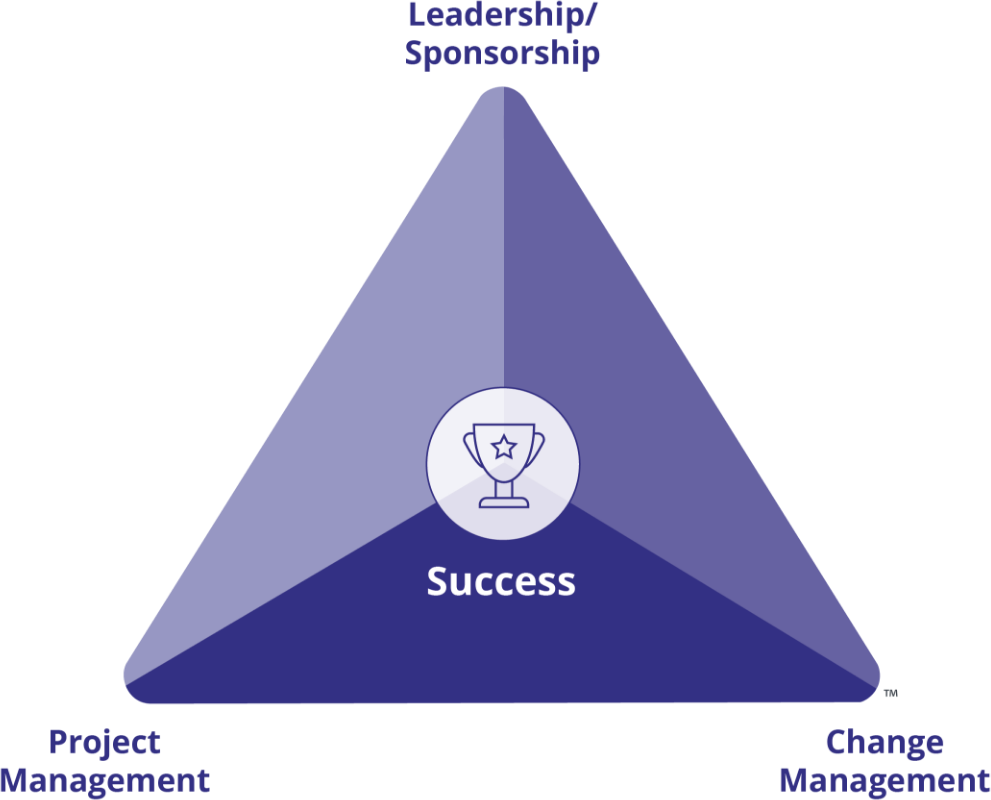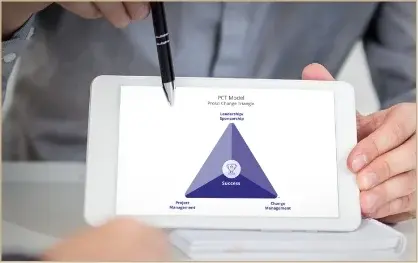
The Prosci Change Triangle (PCT) Model
A framework that shows the four critical aspects of any successful change effort.
Establishing the critical aspects for success
The Prosci Change Triangle (PCT) Model is one of the two foundational models of the Prosci Methodology, in addition to the ADKAR Model. This simple but powerful framework helps practitioners understand the four critical aspects of any successful change and how they relate to and promote project health. It highlights where change management fits into the bigger picture that includes the leaders involved and how the project is managed.
Prosci research reveals that if a project is weak in any of the four aspects, it will struggle or fail. The PCT Model in the Prosci Methodology diagram emphasizes that any change management strategy begins with success in mind. Still, practitioners typically leverage the PCT Model in all three phases of the Prosci 3-Phase Process.


The 4 aspects of the PCT Model
The PCT Model is comprised of four aspects that are critical for a successful change:
- Success – the definition of success for your change, which includes the reason for the change, project objectives, and organizational benefits
- Leadership/Sponsorship – the direction and guidance for a project, including who is accountable for defining why a change is happening, how it aligns with the direction of the organization, and why it is a priority
- Project Management – the discipline that addresses the technical side of a change, by designing, developing and delivering the solution that solves a problem or addresses an opportunity, within the constraints of time, cost and scope
- Change Management – the discipline that addresses the people side of the change, enabling people to engage, adopt and use the solution

The PCT Model provides a framework and common language so teams can connect these four aspects of the project. Key stakeholders develop a shared definition of project success comprised of various facets of leadership/sponsorship, project management and change management.
Prosci is changing the way we approach projects and project management… Project managers are consistently more invested in thinking about the impact of their projects on their stakeholders. The effect this is having on project ROI and outcomes cannot be overstated.
– Mary Brackett, University of Virginia


Assessing project health throughout the project lifecycle
A healthy change initiative has clarity and alignment on what the change is aiming to deliver so practitioners can effectively manage change with the desired outcomes in mind. Periodic assessment of project health throughout the project is also important to project success. That’s where the PCT Assessment comes in.
The PCT Assessment is a core tool for the change practitioner’s toolbox. It’s readily accessible to practitioners via the Proxima online tool in the Prosci Hub Solution Suite.
Key project stakeholders use the assessment to identify what poses the greatest risk to project health. It also identifies opportunities and action plans to improve the health of the project, and therefore potential for success. The PCT Assessment is important for establishing a baseline and then monitoring project health and performance at key milestones over the lifecycle of the project.
Learn More About the PCT Model

Ready to dig a little deeper? Watch this on-demand webinar to learn how to use the PCT Model to clarify your change-related goals for successful project outcomes. You'll also learn about assessing and tracking project health over the lifecycle of the project, and how to use this information to take action.